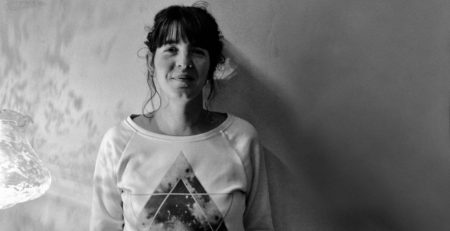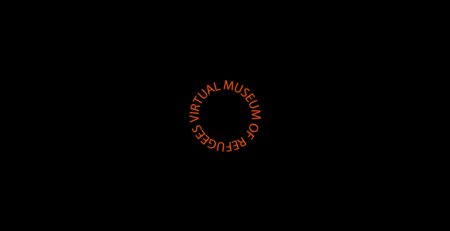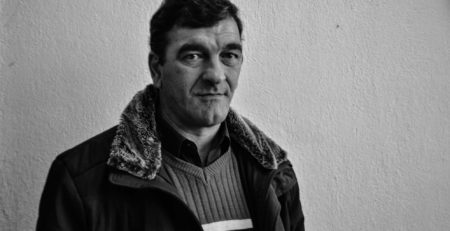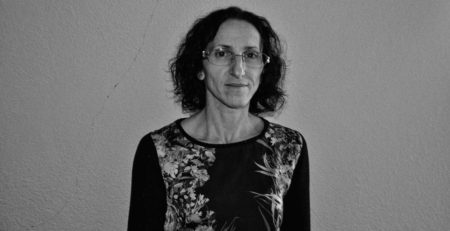Adelina Berisha
Interview with Adelina Berisha
R.B.: Hi Adeline! Thank you very much for talking to me! Can you first tell us how you took the decision to leave? How do you remember that period? Who were you with?
A: You mean when the bombings started on March 25, right?
R.B.: March 24
A: Yes, March 24. I was living in Blendi neighbourhood. At the time, Blendi neighbourhood wasn’t very urbanized; it was a fairly new neighbourhood in Prishtina. It didn’t even have asphalt paved roads. It was more of a village in the outskirts of Prishtina. I moved to that neighbourhood from the centre. I don’t remember exactly, but I know it was Eid when we were first pressured to leave. I was a child, obviously. My father, Tefik, built an underground basement, and prepared a space with some mattresses where we thought we could hide and be protected from the bombings. Some other neighbour families also came there to hide during the bombings, afraid that their houses would be bombed too. As we lived in the outskirts, we were more vulnerable to Serbs’ attacks than other neighbourhoods. A hill known as the Jews Cemeteries lies in front of our neighbourhood, and it was full of police officers and soldiers, and we always saw the attacks coming from there. So, on Eid, we left our house and went to a different neighbourhood known as Kolovica e Re. it was a new neighbourhood that was being built; very few houses were inhabited, most of them were under construction. All of us went there that day. We stayed until late at night. The men used to go to the neighbourhood and they saw there was no crisis so we went back to our houses by midnight. Obviously, we thought the situation had calmed. I was 14 back then. Then, on April 1, we were all asleep when we heard bullets hitting the roof of our house. I remember my mum came and told us, “Wake up! We have to escape!” We woke up, and all of us escaped from the neighbourhood. I remember my sister Leonora had just stared dating Bersant, who is her husband now, and she was the only one from all of us who was a bit more prepared, because she had some photo albums she wanted to take, as memories of her boyfriend. She also had a luggage with clothes and those photo albums, but she forgot it at home, and when we left, Nora went back to take it. I ran after her. I know bullets flew by our feet. That’s when we realized that this is not a joke; it’s quite serious and threatening. She took that luggage quickly and we left. We went to Taslixhe that day. A family accommodated us in their house. I was a child and I don’t really know what part of Taslixhe it was because, as you know, it’s quite a large neighbourhood, but we spent a night in that family’s house. Because the idea of my parents was to wander around in Prishtina, not leave the town, but try to stay here. However, in the next morning, they evicted us from Taslixhe too. We went to my uncle’s house, who was living in the neighbourhood of Dodona Theatre at that time. We stayed there for two days. Again, they came and evicted us from that neighbourhood, like Serbs used to do. They would just knock on the door and say, “Leave the house, leave the house! Go to Albania!” We left from there too. We were about 16 people. Five children and my parents from my family. So there were seven of us from my family, four from my uncle’s family, him and his wife, and his son with his wife. And his other son who lived in Bregu i Diellit, with his wife and 3 kids. We went from my uncle’s house in Dodona to his son’s apartment in Bregu i Diellit. There were 16 of us in a small apartment, one bedroom and one living room. I don’t even know how we slept that night. However, his apartment was in front of the Student Dormitories, and they were full of paramilitaries. We saw the snipers going through our windows the entire night. The adults tried to keep us away and prevent us from understanding what was going on in every possible way, but I still remember the voices of men switching shifts to keep guard in the balcony, secretly going out to hide from the paramilitaries. My uncle’s son had a Serbian friend with whom they had good relationships before the war until the war started, but the son of that neighbour was a police officer. My uncle’s son went to him and asked him, “Can you ensure us that you will at least tonight protect us because we have little children here, we’re 16 people?” Although they’d been neighbours and had helped each-other in any situation or had the freedom to ask for each-other’s help, that day, that neighbour told him, “I’m sorry, but don’t count on me to protect you because my collages are killing even my Albanian soldiers.” I never forgot this, although I was a child, because it was so hard to accept that the people who had always been there for each-other, all of sudden everything changed and they turned into enemies. The morning dawned. It was very challenging to go out, and the streets were full of paramilitaries. So, we tried to disperse, not go all as a group. I remember, I was left with my cousin and his family. I felt really bad because my family was behind. Maybe because I had a very close relationship with my cousin’s daughter, Greta, we were the same age, and that’s why I wanted to walk with her. I remember, I suddenly turned around, when we arrived at the Students Mensa, and I couldn’t see my family. They also said there’s a police checkpoint at Naim Frasheri School. That’s when I realized that I will never leave my family again because I may never hear of them again, I won’t know where my parents and my siblings are. Fortunately, we reunited. I know they were stopped by the police or paramilitary groups at Naim Frasheri school. Then we came home. Again, the adults tried to spare us but I wasn’t a baby to not be able to understand what was going on. But, I guess, my defence mechanisms stopped me from asking too many questions to, kind of, spare both myself and them. In the morning, we went back to my uncle’s house in Dodona, with the idea of not leaving Prishtina. When we went there, everyone had left. All Albanians had left their houses. It was only us. By noon, a girl from the neighbourhood came there. She’s married somewhere else now. She had come there with her husband to shelter at her family’s, but since everyone had left and didn’t find anyone there, they saw our house was the only place with people. I remember our parents told us, “Go play upstairs!” That woman was very anxious; both her and her husband were crying. They had escaped from Qafa. I feel like there had been an attempt to rape her or something similar which made my parents send us upstairs as quickly as possible so that we couldn’t hear what she would tell. Maybe she just told them what the paramilitaries were doing, I don’t know. I never asked my parents what that woman told them that day. I just know she became the reason why we decided to escape because there was nothing we could do here anymore; it was too dangerous if they would find us alone in the entire neighbourhood. We left slowly, together. If you know where “Te Kater Lullat is,” that part in Dragodan was full of paramilitaries. In my memories, they’re like beasts, and their eyes were wild: it wasn’t the look of a normal human being. Now we all know who the paramilitaries were. The paramilitaries were the biggest criminals who were taken from prisons, and they were drug abusers, so they were literally devoid of any feeling. They didn’t see you as a human being. You could also see Serbian women serving them raki, and they used to tell us, “Za Albaniju!” Meaning, “Go to Albania!” and they would tell us to get lost by hand. We walked with our heads down; no one could dare to say a single world. At that time, Prishtina had 2-3 neighbourhoods that were more developed; Qafa had some shops that were more appealing and we used to go there and look at their Adidas and Nike products from the windows. We couldn’t buy those things, we just looked at them. All of those windows were broken: Serbs were using the situation to steal sneakers, while we were escaping for our lives! As a child, nothing of this made any sense to me! But that was the reality. We kept walking. When we arrived in Dragodan, there was another paramilitary checkpoint, and they stopped my uncle. They asked him for his money. Fortunately, the regular army was patrolling at the same time, and apparently, the paramilitaries were afraid of them, because of their hierarchy. So they let us go; they told my uncle, “Go, get lost!” When we went to the train station, which was the first time for me, we saw it was full of people. The night fell; it was cold and raining. We tried to burn some fires until the train arrived. The train finally arrived. Everyone tried to get their family in – the survival instinct! My brother and my uncle’s sons got us in the train through the windows. They’d just throw us inside. I don’t know why we didn’t think properly: someone could’ve gotten in and saved the seats for us; they’d just throw us on top of each-other. Although the train booth was meant for six people, there were 16 of us in there: Granit, my uncle’s son, was about 2-3 years old. I felt really bad there. The most difficult moment was when I got in the train because I didn’t know the war meant they could kill us or commit violence against us. I just said, okay, this is it. I don’t have friends anymore, I won’t go to school anymore. Somehow, the key of our house ended up in my pocket, and when I put my hand in my pocket, I touched the key, and it reminded me of this entire reality, and I couldn’t stop crying. I remembered I sobbed there, and just wondered, “What is going to happen to us? When will I see Lyra? When will I see Edona? When will I see my friends? Maybe I will never see them again.” We had seen movies about what they did to the Jews in Germany, and we were afraid those things would happen to us. Now, we were the protagonists of those movies! You saw all those scenes and that puzzle was completed: although you were a child, you knew something wasn’t right. I wasn’t afraid as much as the adults probably were, though. My eldest sister was 24, the other sister was 20, the other one 18, and my brother 22. And I remember my eldest sister telling us, “Look bad. Wear your hats. Make yourselves look like men!” I asked, “What’s wrong with her? She’s lost her mind apparently.” Later I realized that there were rumours they were taking young girls and raping them, and the young men to war. She believed this was a way of protecting herself. Now I know, however, that physical appearance didn’t matter to paramilitaries and murderers because they didn’t care if you were pretty or not so pretty, whatever that means. Being a woman was enough for them to do whatever they intended to do. We all know that violence against women is also a means of war, not only guns.
R.B.: So you went to Bllace.
A: Eventually, we arrived in Bllace. We suffered psychological violence as well, because they would tell us, for example, “Walk on the railroad only!” The railroad was narrow, and there were thousands of us walking there. They used to tell us, “The moment you step out of the railroad, you’ll step on bombs and they will explode!” So, we all walked on the railroad. Now when I think about it, maybe there were no bombs there at all. They just wanted to torture us more, even emotionally, to make us feel even more worthless, to completely destroy our dignity and everything we believed in. But, eventually, we made it to Bllace. When we went there, we saw a pasture, and apart from some bags where we had quickly put some clothes in, we had nothing else: No food, no tents, no sheets, nothing at all! I remember spending the first night there, in the rain… I remember once we ran out of water, and Gerta (my cousin who was then 12, I was 14) and I saw the houses at the border in Bllace. We could see some abandoned houses, so we thought we’d go there and look for water. We walked and walked. There were some men in uniforms, with big guns standing on the walls of that house. I don’t know if they were the army or paramilitaries. They told us, “Get away from here! This is Yugoslavia’s territory!” Fortunately, I learned Serbian from TV as a child, because we had nothing else to watch so we learned the language. Greta and I looked at each-other and we didn’t really think they would threaten children, too. So we kept walking, and he screamed, “HEY!” Then I realised he was talking to us. So we returned, and we couldn’t look for water. We went to our family. I know everyone would go to look for food, sheets or anything, but we couldn’t find anything that night. I think the next day they started distributing relief items and throwing breads from some tractors. Those who were lucky grabbed some, those who weren’t were left with nothing, or the bread would end up in the mud. We also met my aunt and uncle in Bllace. People kept coming and going. My uncle, who was older, was taken by the emergency. I don’t really remember how that happened. But they left, while my family and my uncle whom we met later remained there, in no man’s land. We were stuck there. The Macedonians wouldn’t let us in. I remember we got very tired. We were staying in a pasture, and there was a hill you had to climb to cross the border. Some people started escaping by force. The Macedonian police arrived. Then, an agreement was concluded, after Albanians in Macedonia protested, saying, “We will not leave Albanians in the streets. We will open our doors and shelter them in our houses!” Because the state of Macedonia claimed the country had no more capacities to shelter the refugees. Later, they started building the camps, but only after the international community intervened. Five days later, we got in the bus. The border was opened, and the buses came to pick us up. I remember, however, that we wandered around in those buses for at least 20 hours, probably travelled through entire Macedonia to see which municipality would accept us. Finally, in Gostivar people started protesting in front of the buses, saying, “Bring them to Gostivar! We want to shelter the refugees!” They took us to a mosque. The next day, when we woke up, Macedonia Albanians kept coming to take the refugees to their homes, and everyone told how many people they can shelter. The one who sheltered us was called Taip Shabani, and we still keep in touch. We went to village Gradec, which is between Gostivar and Tetovo, but it’s under the municipality of Gostivar. Life in Gradec was, however, a bit shocking to me and my family. I felt a bit better when I started going to school, but I had hundreds of other problems when I went there. My sister Laura was in her senior year at highschool and she didn’t want to go to school. I guess she felt like we’re betraying our friends from Kosovo, but maybe she also had a feeling of guilt because she survived while she didn’t even know where the rest were, and she might have asked herself, “Do I deserve to act like nothing happened?” I don’t know, we had a lot of mixed feelings. But at least, I had something to do when I started going to school. I was a student who loved learning and reading, and it made me feel well. The teachers, to be honest, were very nice. However, the mentality there was much different from what I was used to in Prishtina. I was attending grade 8, which meant I had to start planning about secondary school. And teachers started advising you, “Now is the time to learn as hard as you can because you have to pass your Matura exam.” And it was so sad that very few girls, not to say none of them, knew if they were going to attend secondary school. I was the only one who would raise my hand and say, “I will go to Medical school and study dentistry because I want to be a dentist.” As a child I always wanted to be a dentist. There were three eight grades. The teachers would often ask me to talk to the girls and encourage them, tell them why it’s important to attend secondary school. They used me as a role model for the other girls, telling them, “Look at Adelina! Although she escaped from war, she still wants to go to school.” Obviously, as a kid, I couldn’t understand that it’s not because they didn’t want to go to school, but their families don’t let. Although, the girls weren’t that enthusiastic about it either. So, you gradually came to know the reality those girls faced in that environment, where the patriarchal norms were much stronger than in Prishtina or other cities. I’m not saying they didn’t exist here, but as a child, I never had any obstacle just because I was a girl, and I wasn’t worried I won’t be able to go to school because I’m a girl. I realized other girls have these struggles in other places. On the other hand, their life standard was quite high because most of them lived abroad and they didn’t have any financial difficulties. it wasn’t because they didn’t have money that they could not go to school. It was literally because they didn’t see it necessary for girls to get an education too.
R.B.: Were you influenced by that mentality? Were you afraid you would end up like them too?
A: I was very afraid! I knew my family wouldn’t do that to me, but I was afraid their mentality will gradually change because, you know, you become who you surround yourself with. That was my biggest fear, and I missed my friends from Prishtina with whom we talked about great dreams and ambitions. Fortunately, the war ended and we have all achieved what we wanted in life. But while we were there, I always had this fear. And, to be honest, when you engage in those conversations, it can influence you as well. I was really afraid I would lose my wish to get an education because apparently girls can also just do nothing. That wasn’t even an option for us. We all strongly believed girls must get an education. At least, that’s how we were raised by our parents. If you want to be independent, you have to get an education. There, however, an entirely different reality prevailed. One of my school friends invited us to her house. I knew she had a lot of money because everyone from my grade used to say, “Oh, Qamile is really rich!” We went at Qamile’s, and when the large, luxurious gates opened, which I had seen only in movies, we saw her dreamy, stunning house. She invited us to sit in a veranda that was made of wood. She started making skutaçe. Skutaçe are traditional clothes made of wool, tied in the front. They’re called konec or konec in Has, Kosovo. So, she was focused on making her dowry for her wedding. It was a time when she was supposed to be studying to go to secondary school. When the teachers asked them, most of them would say they’d go to a two-year school; I don’t know what that is but they weren’t going to attend secondary school to then be able to attend university. They didn’t even think about it! Then, I was worried about whether I would manage to enroll in secondary school because we thought we’d stay there forever. We didn’t know what will happen after NATO’s intervention or whether Kosovo would be liberated. I started to think that would be my life from now on. Obviously, I also had other concerns. Nobody knows me here. How do I demonstrate I’m a good student? Will I be admitted in the Medical School in Tetovo? In the village there was only the primary school. Will I be able to follow my dream? I was also concerned whether I’d be able to meet friends with whom I’d talk about things that mattered to me because, unfortunately, we weren’t on the same page with the girls, or the boys, of Gradec. So, as horrible as the war was, we were lucky to return to Prishtina, the capitaly city, where a lot of things had changed a long time ago, and this was a very shocking reality check I had there.
R.B.: How long did you stay there?
A: We stayed until July 1 because, although Prishtina was liberated on June 13, we celebrated the liberation there and we could have come earlier – my brother came even before Kosovo was liberated and the NATO troops arrived. Lan was the first to come here because he wanted to find a job with the internationals and see what happened to the house. This was another trauma because we didn’t know what was going on. The traumas are different – one forgets a lot of things – but, for example, while we were in Bllace, I was a kid, and someone came and told me, “They’ve killed your uncle, your grandma; they’ve killed all your family.” I could see my mother already between madness and whatever we consider normal. And, I remember keeping that a secret the entire time we stayed in Bllace. I didn’t want to tell my mother they had killed her brother and her mother because she will find out one day, but at least I won’t make her emotional situation worse. There were different rumours: they’re diving the boys and men from their families. She was worried about my brother, “They will take my son. They will take my son.” I didn’t want to add to her burden… so I kept it a secret. The day we went to Gostivar, my uncle was there. He had gone to every mosque, every day, looking for us, because he had arrived there before us. I had a feeling of ecstasy and liberation when I saw him; I felt like a crippling burden was lifted off my shoulders. There were all kinds of rumours. My uncle’s son, for example, came from London to join the KLA. He came to visit us after a while; I don’t know how he managed to escape. Seeing him, a young man in his twenties, in that physical and emotional condition was another huge shock! My cousin’s son who was 8-9 also had troubles sleeping because he had nightmares. You know, there were all kinds of traumas everywhere around us.
R.B.: Can you describe Prishtina a bit when you returned?
A: I felt relieved from the moment we crossed the border and came to Kosovo because I knew I was in my own territory. But I knew it was very difficult seeing all the houses destroyed. When we arrived, our house was a mess. It was used by our neighbours who came in June, thinking that we wouldn’t come back anymore. Unfortunately, the Albanians did some of the damage themselves because they thought “these people have left, they won’t come back.” We were all very happy and excited that it was all over, our dream came true, the Serbs have left, but we were also sad because, for example, we saw some of our belongings in our Albanian neighbours’ balconies. This was quite disappointing. But, on the other hand, now I understand them because when people are going through an existential crisis, everyone cares only about themselves, no one else. But I remember we were quite sad about this, about how they forgot we ever existed, they thought we’d never come back, so they just stole what belonged to us. At least, we immediately found our friends. We went back to school in August to make up for the lost classes as soon as possible because I was concerned about applying to Medical school. We divided a bit then because some of us went to natural sciences, mostly in the Sami Frasher secondary school; 2-3 of us were in Medical school. But it was a great time because we also organized our prom. We really went back to our normal lives again because, I guess, since we were children, it was easier for us to forget and go back. Although the main institutions in Prishtina, the Post Office and the others, were bombed, you didn’t see many consequences of the war like you could, for example, in Gjakova or the other towns that were more destroyed. Or, even worse, for the citizens of Mitrovica, who, eight years after liberation, went through something even worse than in wartime. When you think about, you can’t really say when this whole thing started and when did it end. Looking at it in retrospective, and because one faces many other things in one’s lifetime, I can see I’ve matured and I can look at it from afar like just a story. If we were having this interview 5-6 years ago, I’d probably be crying now. Or maybe even a year ago, because it’s still a trauma. I notice when I have to travel to Macedonia, and I see the border and Bllace, I immediately remember all of those scenes. I believe all of us who went through that experience this. Travelling by train is also still a trauma. I haven’t often used the train in Kosovo, but I remember going on a EuroTrip once, and seeing the train for the first time since then really rekindled that memory. We all share that trauma, when we hear the Serbian language, when we see uniforms. When I went to Serbia once, I saw that uniform at the border. But what other people went through really makes me stop and I tell myself, “Adeline, compared to what other people experienced, our experience is nothing!” And then I find some strength. But we all have traumas. The children born in the 2000’s who didn’t even experience the war, unfortunately, have traumas, because trauma is inherited, as we all know. It is also scientifically established that stress and anxious thoughts influence the genetic code, and the worst thing is that maybe our descendants will also inherit this trauma. Unfortunately, we aren’t dealing with it, but I hope we will become aware one day – it’s not that we don’t talk about it but we don’t properly, publicly talk about this collective trauma. But we should. We should compare what we went through, our sufferings, our traumas that have piled one on top of the other since our grandparents and great-grandparents. My grandfather died when my dad was really young: he never knew him because the Serbs killed him in 1945. Let’s just hope there will be no more wars and it will end with us. We’ll deal with the traumas somehow.
R.B.: Thank you very much.





